Grateful…
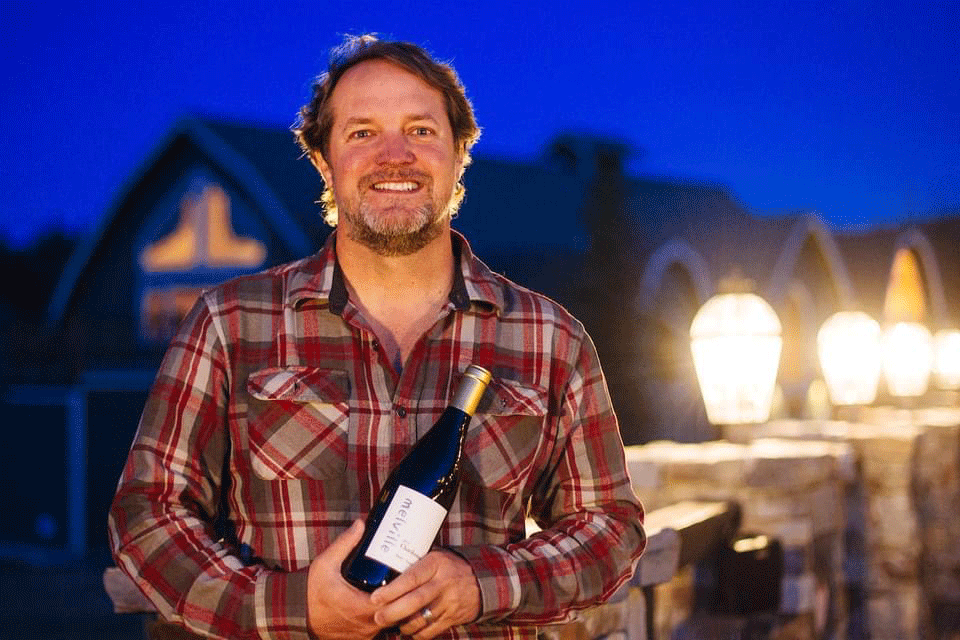
Hi,
“Grateful” is one of my favorite words. If you know me well, you might assume it’s because of the greatest band of all time, but, this word and concept have always resonated with me on a deeper level. As I prepare for the Thanksgiving holiday, I find myself looking inward to consider what I’m especially grateful for this year, and I’d like to share some thoughts…
Though I am, of course, grateful for the love and support of my friends and family, as well as our amazing customers, when I reflect on gratitude this year it’s our team here that really resonates. I can’t even begin to describe the hard work, commitment, and dedication each person contributes day in and day out, especially through this pandemic. From our full-time vineyard crew nurturing our land, to our office team meticulously fulfilling orders and ensuring you are always up-to-speed on all things Melville, to our tasting room associates passionately sharing our wines and story with you each day…our team is invested, our team is loyal, our team is the heart of Melville. I am profoundly grateful for each person I am privileged to work alongside. Thank you to everyone who has picked, punched down, emailed, and served up wine from this beautiful place. My name might be on the bottle, but please know, it’s their dedication and spirit captured in there as well.
Thank you for being a supporter of Melville—both our wine and our team–we couldn’t do what we do without you.
Peace and love, and Happy Thanksgiving to you all! Nothin’ left to do but smile, smile, smile…
– Chad Melville

Love in the Time of Covid-19
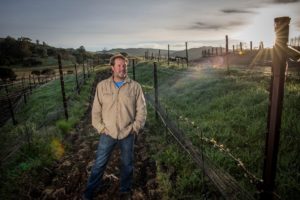
“We must use time wisely and forever realize that the time is always ripe to do right.” -Nelson Mandala
It’s been a while since I posted a journal entry. But, like many of you also sheltering in place, I’ve had a little more time on my hands. Maybe as a way of remaining calm, I’ve been trying hard to take things a day at a time lately. It’s hard to practice this in uncertain and scary times, but it’s one small way to remain a little more tranquil.
I’ve been spending a lot of time in the vineyard, even more than usual, because it helps me stay present. My feelings towards our vines are even more poignant lately. This has effected how I’ve been enjoying wine. Typically, there’s always a part of me that’s tasting a wine to learn; learn how to be a better farmer, a more intuitive winemaker. Lately, though, I’m just enjoying it. I’m allowing it to simply lift my spirits and make me smile. Even as all of us struggle to navigate jobs, businesses, finances, I’m feeling more connected to my livelihood than I have in a long time. Some aspects of these strange times remind me of when I first entered the wine business. Back then I was concerned and nervous for other reasons; wanting to do right by my dad, my boss; anxious to learn how to make a wine good enough for people to enjoy and maybe even want to cellar; eager to learn how to be a legitimate farmer and not just talk the talk. These now strike me as a younger man’s concerns.
Today, my concerns turn outwards. They range from how my kids will adjust to this sheltering in place as the days wear on, as they’re already feeling isolated from their friends and they miss their routines. My 15 year old daughter begging, I mean begging me with tears to visit with some of her friends. They’re also older now and more attuned to my anxieties than when they were little. My job now is to remain calm and positive for my family and employees, even as we all struggle individually and collectively.
The news cycle bears down on us twenty four hours a day, adding to a culture of fear. At the top of every news hour Death and Economics lead the charge. While I am acutely aware that these are dire times, I am also aware that our species, a beautiful one at that, is much more expansive than the media might suggest. Money is only one of the currencies available to our species. And, yet, we make it king. So, when the threat of an economic destabilization looms, we buckle; the ground beneath us moves. How will we survive without material things? Without shelter, without food?
Two currencies available to us in abundance are love and empathy. When we trade in love and empathy, a quiet healing takes place. All around the world, there are people trading in these currencies, and from these exchanges come assistance, in the form of comfort, understanding, food, shelter, care, kindness.
What can each of us do to turn outward? A nurse enters a grocery store after working a grueling 24-hour shift only to find the grocery stores shelves bare. Service industry workers, and so many others, who were living paycheck to paycheck, struggle to afford even the most menial bills. While so many of us enjoy binge watching shows and movies at home, many cannot even afford basic cable and streaming services. The libraries are closed. They have little entertainment or solace available to them. Many of these people live solitary lives and have no one at home to help ease their mind.
There is so much we can do with our reserves of love and empathy. It is often said that what separates us from our fellow species is our ability to empathize. What a time to demonstrate this. And, so perhaps if we take less when we’re shopping and leave a little behind for the next person, we can trade in that currency. For those of us still traveling to work—I have been in our vineyard and driving to the winery on a nearly daily basis—there are opportunities all around us. A few minutes is all it takes. The next time you’re at the store, post office or other essential business, make eye contact with one another and smile (while practicing social distancing). So many of us are somber while we shop, not looking at others, as if even a look might transfer the virus. Instead, I’m trying to lift my head, smile, or lift my hand in greeting. There are still ample opportunities for us to connect with our fellow species. Spread love. It’s easy. It doesn’t cost anything. “Once in a while you get shown the light in the strangest of places if you look at it right.”
Fear of the other can bankrupt our reserves of empathy and love. Wouldn’t it be great if one of the one positive outcomes of this time would be renewed sense of these currencies? They are fun to trade in and one can be imaginative in doing so. Let’s maybe at least try.
I’ve put together a little playlist (click here) for you that I’ve been listening to. I hope you enjoy it. Of course, those of you who know me know I couldn’t possibly make a play list without including The Grateful Dead. “Here Comes Sunshine” is dedicated to you, my friends. Let’s pretend that life right now is a virtual Grateful Dead show where helping others with food, water or just a hand is commonplace. And, if you need help, don’t fear asking a stranger. Let’s all stay safe, practice social distancing, and the other guidelines set forth. But, let’s not stop loving each other. There’s no virus that can kill love, kindness and empathy.
Chad’s playlist: https://open.spotify.com/playlist/4DgKN0q4VTI0M9HkFHn0DS?si=3Ton8eKZQi2Z3joI2d-PmA
Resolutions
Some of the biggest lessons I’ve learned in life have been from my dad. This might surprise people who know us both because we’re very different people. When I was younger, I found our differences very challenging. Here I was, a surfer raised in Laguna Beach to some degree of privilege, standing in the shadow of a father who grew up very modestly; an entirely self-made man who literally came from nothing.
Once, when I was about fourteen, I needed cash to go goof off with my friends. My dad told me I could have 5 bucks if I washed his car. After I was done, he came out to observe my work. After walking around the car a couple of times he told me that if I wanted the cash, I’d have to do it again. My first reaction was, “F— that!” Of course, I said that in my head.
Contemplating, I decided I still needed the money and I washed his car again. That was a huge lesson. Not only did I learn how to better wash his car in the future, so that I’d get my five bucks the first time around, I also learned, more importantly, that there are no short cuts in life. This vital lesson has translated well into my work at Melville. When I’m hiring cellar help at harvest time, for example, I’m fully prepared to demonstrate for someone exactly how we want our barrels washed, our bins washed, our barrels stacked, our wines racked, because I’ve done each one of those chores myself.
These days, there are all kinds of warm and fuzzy platitudes about how, in one’s sunset years, one shouldn’t think about their success in business, or how many days they spent at the office. Instead, presumably, they’ll be better off; they’ll be better people, if they think about love, nature and what really matters in life. But, what if what matters most to someone is the work they did? The success they had? If they came from nothing, and created for their family a life beyond their wildest imaginings, isn’t that also important? Isn’t that also purposeful? Being a parent myself has, I hope, made me a better son. In this, my 46th year, I’ve had a revelation.
A few years ago, I thought I was pretty smart when I realized that I couldn’t get away with trying to raise both of our children in exactly the same way. I patted myself on the back the day I finally saw them as individuals, with their own strengths and weaknesses. I began responding to their individual and unique attributes and fallibilities, rather than demanding that both of them do what I say, when I said it, for reasons that I alone deemed valid. I began to truly understand that they each needed different things; different lessons learned, and different approaches to teaching those lessons. When I saw them as real individuals, rather than as conceptual children that were supposed to fit into some framework of what I thought children were supposed to be like, I started to enjoy parenting more. And, most importantly, I appreciated them more as fellow human beings.
So, why did it take me 46 years to realize that those same principles apply to one’s parents? Instead of expecting my father to fit into a pre-conceived notion of what a father should be—a notion I got mostly from society, from television, from the movies—I started to see him as an individual. It was through that lens that I finally saw him for the exceptional man that he is.
Ron Melville was brought up by a strict, military father, and by a mother who was very strong and reserved. As a result, he grew up with a great deal of structure, discipline and relentlessly hard work. As a boy, he heard stories from his mom about how she was raised in a home without refrigeration. She would tell him about what a privilege it was just to be able to afford to eat meat once a month. As a result, he learned as a very young boy that nothing in life comes free.
My father will work every day for the rest of his life. He’s that type of man; a different, rare breed. When he goes on vacation, he’s still not really on vacation. His mind is on the business. His mind is on how to improve. His mind is on continuing to analyze and figure out how to make things better.
When my dad bought this land in the Sta. Rita Hills in 1996 and 1997, it was with the intention of planting and growing fine wine. At the time, my brother was in a position to essentially start working in the vineyard pretty much right away, and he relished it. He’d call me up almost daily to tell me about how great it was to be outside every day, farming, planting, planning a winery.
Due to commitments I had at a job in the world of finance, I wasn’t able to join the family business right away. Finally, after a couple of years, I transitioned out of my burgeoning career in finance and told my dad I wanted to join him and my brother out at the winery. My dad’s response? “Why would I hire you? You have no experience.”
And you know what? He was right.
So one spring day, I decided to stuff my backpack full of about 40 resumes and attend a Santa Barbara County wine festival, in the hopes of networking with winemakers who would hopefully hire me. Looking back now, it was maybe the worst day of the year to try and find a job in wine country. Winemakers were engaged with their customers at a busy festival with nearly 1,000 attendees. Add to that the fact that my resume reflected I didn’t have a stitch of experience working in a winery. But, of the 40 resumes I handed out that day, one winery reached out and called me: Santa Barbara Winery.
I went to work for Santa Barbara Winery in early 1997, still located in downtown Santa Barbara (perhaps one of the first successful urban wineries in the nation), for a gentleman named Bruce McGuire, who put me to work in their tasting room; learning the ins- and-outs of hospitality; how to properly and politely present wine to the everyday consumer; how to demystify wine while still making it somewhat romantic and interesting; how to provide good, fundamental customer service. It was an invaluable time. After a while there, I transitioned into the cellar and worked harvest, dragging hoses, cleaning barrels, driving forklifts, washing bins. I remember being so tired some nights that I could barely remember my own name.
After I got plenty of experience at Santa Barbara Winery, my dad hired me. I remember that day very clearly. He said, “Okay, you can live in a trailer in the vineyard, drive the old white vineyard truck and I’ll pay you minimum wage.” In case I hadn’t learned it that time I had to re-wash his car, here was that lesson again; in life, there are no short cuts.
These days, with regard to parenting, we talk a lot about wanting to give our kids things we never had. We want to shelter them from the harder aspects of growing up: disapproval, not being accepted, not being popular, not being liked, being rejected, and not getting what one really wants every single time.
None of that stuff was really talked about among my father’s generation. What my dad wanted to give me he did in fact give me. He wanted me to appreciate what I have by making the road to my success the hardest it could be. How would I be able to appreciate what I have today if I didn’t have to earn my way there? I can look my father in the eye now and say, ‘It was such a rough road to get here but I’m so glad you made it that rough on me.’ My own personal success means so much to me today because I’ve cleaned toilet drains at the winery; the septic system, barrels, lugged hoses over my shoulders while soaking wet at the wee hours of the morning (and that was just a few months ago). I’ve worked in the tasting room, packed wines to ship to our wine club members, gone on sales trips, planted vines, pruned vines, picked grapes, farmed our estate blocks day in and day out, I’ve hired and fired people, you name it, I’ve done it, and I’ll keep doing it. Having earned my way here has made me love it all the more.
Like my father, I’ve been fortunate to find work that I love at a relatively young age. My dad discovered early on that he loved numbers, math, and how they relate to the stock-market and to risk-taking. He is a low-risk taker. In the world of finance, he’s the kind of guy that hits singles; he doesn’t swing for the fences. He doesn’t need to hit a home run every single time. If he hits a home run, well, then he’s thrilled. But, the next morning, he’s right back to asking himself, “How can I get on first base?” “How can I steal second?” “How can I get that run home without striking out?” Once my father makes a profit, he takes it off the table, always limiting his risk. That restraint and self-discipline has been the key to his success. It’s very hard to exercise self-discipline and restraint in what is often a frenzied financial environment. But, that’s how he made a living in the world of finance for so long. So many people burn out in that world early on because they lean in strong and take huge, anxiety-producing risks. My father has taught me that the people who last the longest in business, in ways that allow them to sleep at night with a clear conscience, are not the flashy ones.
Last year, I took over the reins as winemaker at Melville. Not long after, someone asked me what my title was. My father never cared about having a fancy title; he was busy keeping his head down, doing the work and holding on to his integrity at every turn. I like not having a title these days. It keeps me inquisitive. It hopefully keeps me humble. Someday, I’d like to be as humble as my dad. Like I said, he’s had a lot of success, and he could drive a really fancy car if he wanted to. Like some winery owners, he could go around wearing tailored Armani suits and fly first-class everywhere he goes. Instead, dad drives a Jeep Cherokee. His daily uniform is a pair of jeans, a simple, pressed, short-sleeved work shirt and top-siders. If he reads that a local store is having a sale on steak on Tuesday, he’ll wait until Tuesday to buy that steak. He is never, ever far from his roots. He is hard-wired to have a deep, abiding respect for things that bring true value to others. I am often asked how we can price our 100% estate grown, Sta-Rita Hills-born Pinot Noir for 36 bucks. That was my dad’s doing.
About 8 years ago we got the highest scores that we’ve ever received for our wines. We always get pretty good scores from wine critics, but that vintage, our scores were exceptional. We got 99 points for one wine, and a slew of others in the mid-90’s…and then one 91. When I saw the scores, I emailed my dad right away. I was so excited! His response was, “what’s up with the 91?” For a moment, I felt like I’d just won the Super Bowl and was throwing champagne around in the locker room, just to have the coach stop me to talk about the penalties I’d gotten during the game. After feeling sorry for myself for a few minutes, I re-tasted that particular wine. I found myself asking, “Why wasn’t that score better? How could I have farmed that block better; to better highlight the specificity of it?” I guess these days, we’d call that a “teachable moment.” And, it was. I learned a lot that day. Mostly, I learned how important it is to keep one’s feet on the ground, especially during those heady moments.
Recently, my son Caden told me and my wife he wanted to play football. It was during a family dinner out at a Mexican food restaurant. I told him that if he wanted to play, he’d have to show up at practice every day. Even when he didn’t feel like; even when he was tired, even when it was cold, he’d have to show up. I flipped the menu over, wrote out a contract to that effect, and had him sign it. He hasn’t missed a day of practice yet, even when he injured his knee pretty badly. In that moment, I could feel our bloodline flowing down from dad to my son.
As I get older, I make fewer New Year’s resolutions, but I take each one more seriously. As I was thinking about the kind of man I’d like to be in 2017, I recalled a day from my youth. We were looking at colleges for my brother up in Berkeley, California. While we were at a gas station, and dad was refilling our car, a stranger walked up to him. I couldn’t hear what they were saying because the windows were rolled up. My dad opened up his wallet and gave something to the stranger. After he got back in the car, as we started to drive away, I asked my dad what that was all about. He told me that the stranger had run out of gas and needed some money. “So I gave him some money,” he said. He didn’t say anything else, and I knew enough, even then, not to prod, because he’s always been a bit stoic. It was such a quiet moment, but taught me so much about the kind of man my father is; sometimes hard on the surface, but with a deep humanity.
So, my resolution for 2017 is to be just a bit more like him. I’m not as good a man as he is yet, but it’s nice to have something to work towards.
The Walking Dead (Tired)
One Day in the (not so) Glamorous Life of a Winegrower
You know how sometimes, when you wake up in the dead of night, it takes a few seconds to even identify what day it is, or where you even are? You’re disoriented; your mind is struggling to acknowledge that your eyes are open. You think to yourself, “Wait, I just went to sleep, how could it be time to wake up?” We’ll that’s pretty much how I feel every morning during harvest.
My alarm goes off early, real early, this time of year. Once I realize I’m awake, this To-Do list will start announcing itself in my head. Fruit coming in, sugars and temps to check, pressing chardonnay, organizing the barrel room, making sure our purple elephant is properly bathed. Then, all of a sudden, that last weird thought will signal to me that I’m starting to fall back to sleep, head first into the land of dreams. And, that nonsensical thought, and the fear of falling back to sleep, will jar me into full-on wakefulness.
I work my way through the routine of finding my tee-shirt and shorts, socks etc, in the dark as I don’t want wake up the family. I grab whatever shirt is on top, first pair of socks my fingers land on and my shorts from yesterday (just because they are right there). The funny thing is, I don’t even see what I’m wearing until I’m long gone from home, but who cares? I don’t. I’m not trying to impress anyone; I already have a beautiful wife, and my kids already think I’m a dork. No changing those things.
I’m on the road before it’s 3:00 AM. If you’ve ever driven this time of morning—or is it evening? —anyway, if you’ve ever driven country roads this early, you know it’s mostly long-haul truckers on the road, and the random car, here and there. Figuring a car out on the road might have a late-night partier behind the wheel, I tend to drive pretty cautiously to work. Once I’m at the winery, I brew myself a cup of coffee. Strong and Black. Just half a cup because I don’t have the time or leisure to sip a full one. Then I turn on the stereo, cranked to Bob Marley and the Wailers “Babylon by Bus.” Energy is a full strength now.
As early as it is, I’m not the first one here. Most of our crew is already outside picking chardonnay; they started at midnight. For all the glamorous associations that surround wine and the wine country lifestyle, we’re first and foremost farmers. And, grapes are produce. You want to harvest them off the vine while they’re still cold, stable, crisp and fresh. You don’t want to pick them in the middle of a hot day, when they’re taxed from the heat, losing moisture and, literally, shriveling up on the vine; that’s when yellow jackets and bacteria become active. Not only that, but when it’s really hot out, and people are working, they tend to get cranky, and very few beautiful things are created while people are being cranky with one another. So, we are committed to night picking.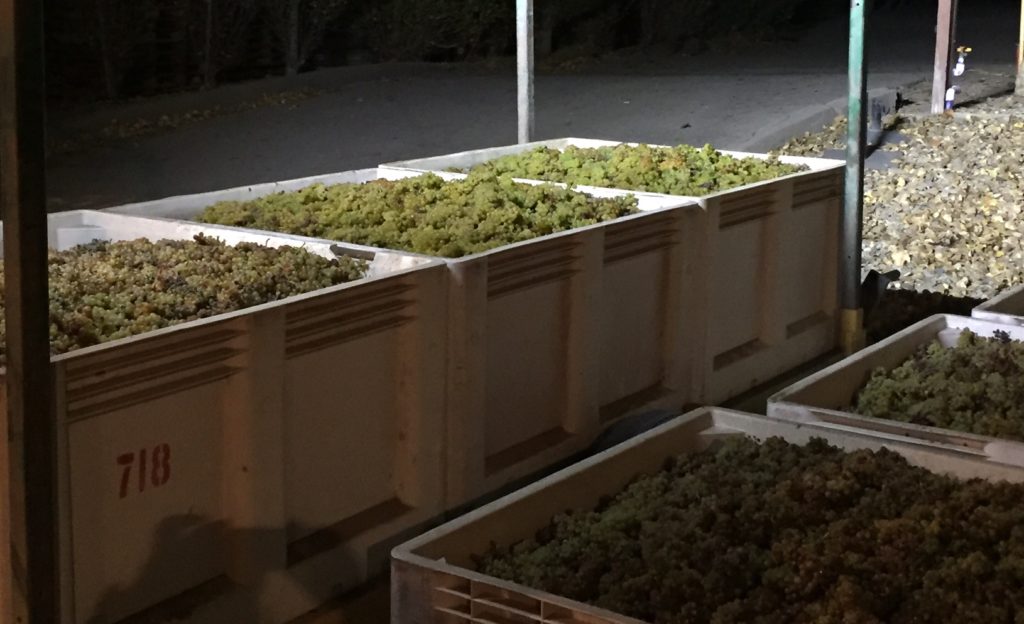
Once I check in on the crew in the vineyard, I return to the winery, open up the cellar doors and start my day. I love how quiet it is out on the crush pad; it’s so peaceful, calm, and beautiful, as if everyone is still asleep, even the birds and animals. I hesitate to turn on the stadium lights we use to illuminate the crush pad, because the serenity is broken. But, I need to get to work and the fruit’s going to start coming in any moment now.
For the next three hours, I press off chardonnay that was literally just harvested, clean lots of equipment, get drenched many times over, drive the forklift, and do a couple of punch-downs.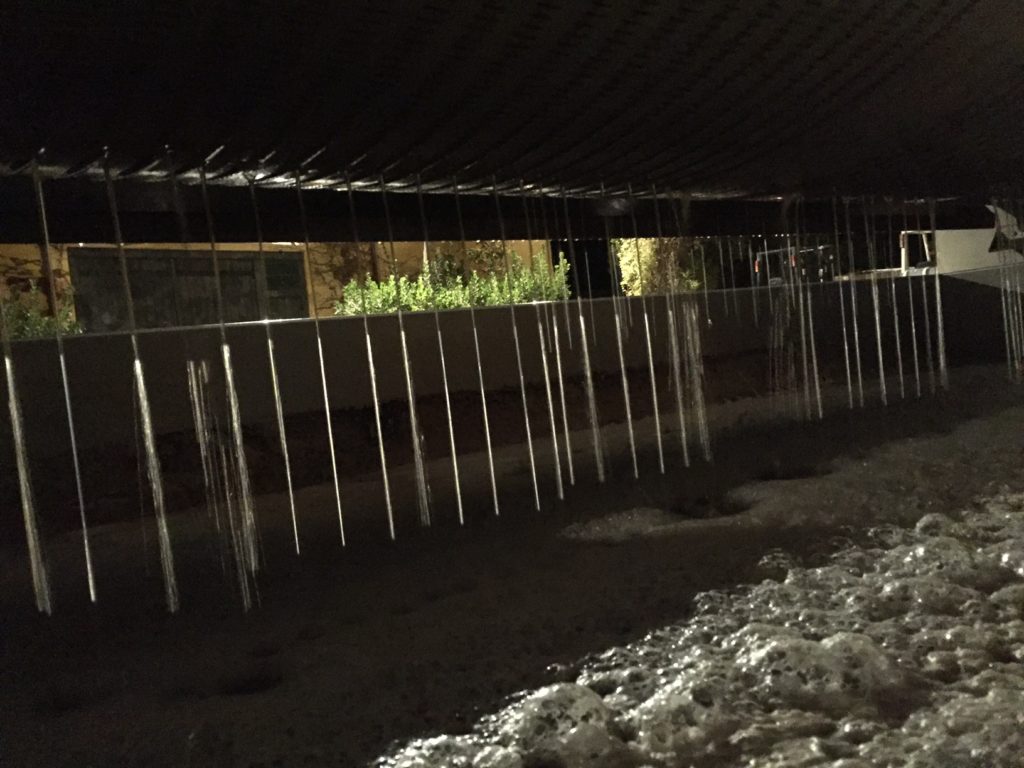
By around 7:00 AM, lunchtime, I clean off the dirt, sweat, dust and sticky grape juice covering my arms and legs, and sit down for a bowl of Cheerios at my desk and that’s when I start checking messages. I remind myself NOT to call anyone as they are still asleep, so I stick to electronic messaging. I do however, call a couple of friends who are winegrowers to see how they’re doing. Andrew Murray. Joey Tensley. Matt Dees. You may have heard of them if you drink the best of Santa Barbara County wines. They’re great winegrowers. Great people. I taught them everything they know. ☺
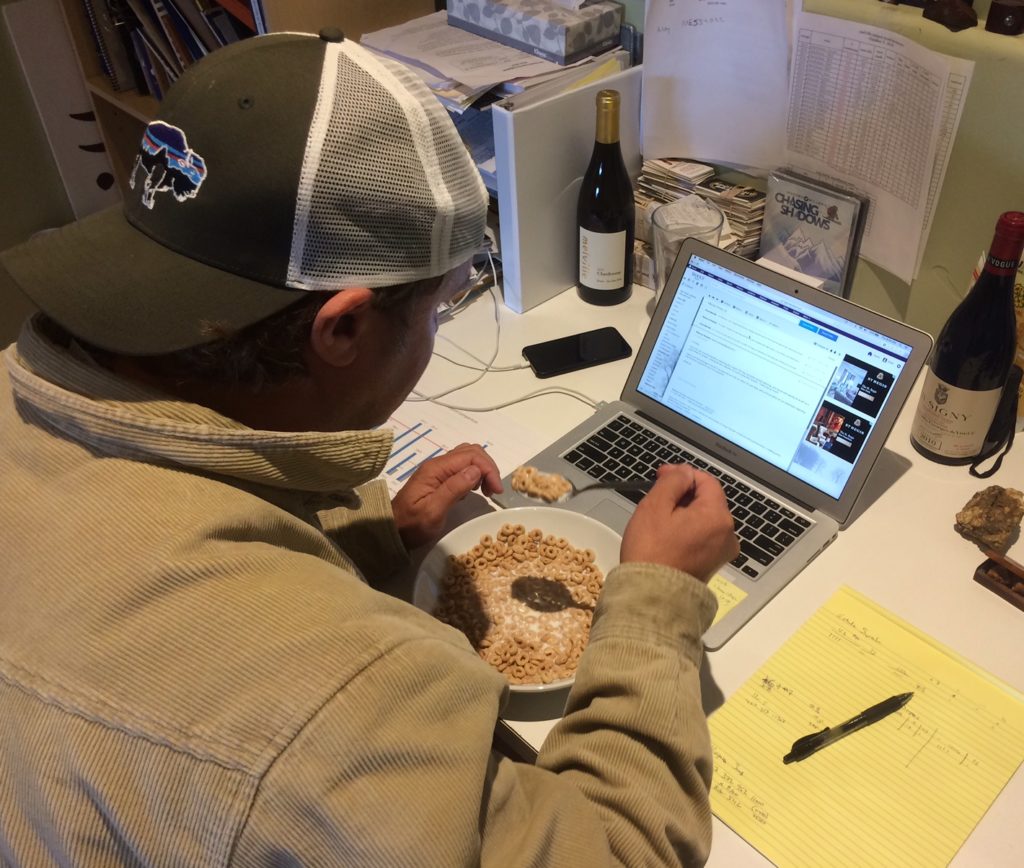 It takes a while to get through the punch downs and pressing chardonnay. Afterwards, I’ll check on our rosé fermentations; half of the rosé is fermenting in tank, and the other half, in barrel. My cellar crew and I also continue to clean and prep barrels for barreling down the chardonnay tomorrow. When it’s not harvest, sometimes there is time shoot the shit while checking barrels and such, but not during this time of year. There is simply too much to do. Not even time to sit down and enjoy a glass of wine, mostly because I would pass out, but also because, mentally, I’m not in that state of mind. I’m too busy. Its “playoff” time: focus and drive. After harvest, though, all bets are off and I hit my home cellar like a kid in a candy store.
It takes a while to get through the punch downs and pressing chardonnay. Afterwards, I’ll check on our rosé fermentations; half of the rosé is fermenting in tank, and the other half, in barrel. My cellar crew and I also continue to clean and prep barrels for barreling down the chardonnay tomorrow. When it’s not harvest, sometimes there is time shoot the shit while checking barrels and such, but not during this time of year. There is simply too much to do. Not even time to sit down and enjoy a glass of wine, mostly because I would pass out, but also because, mentally, I’m not in that state of mind. I’m too busy. Its “playoff” time: focus and drive. After harvest, though, all bets are off and I hit my home cellar like a kid in a candy store.
After a second round of punch downs late afternoon, I head off to pick up my son from home and take him to football practice. I go into stealth dad mode at this point; I’m running on fumes, but I need to get some groceries for tonight’s dinner and pick up my daughter from dance. By the time 8:30 PM rolls around, I’m empty. Done. Toast. Wrecked.
Harvest lasts about two and a half months, until all of the fruit comes in, everything is barreled down or transferred to tank.
Such is the glamorous life of a winegrower.
Eyes of the World
Three years ago, my mom passed away suddenly. It was a tremendous loss, to say the very least. Before she passed, I kept telling myself that one day, I’d get her, the kids and my wife Mary together and head down to Los Angeles to see a musical, because that’s what my mom loved best; watching musicals. But, life got in the way and I never made the dream happen and now it’s too late. I’m good at sharing platitudes like carpe diem and the like, but my mom’s passing taught me to truly seize the moment in a much more literal sense. Sometimes tragedy is the only thing that takes life lessons from being purely theoretical to something much more concrete and real.
So, when my daughter Logan turned 12 earlier this summer, I made good on a promise that someday, I’d take her to see Dead & Company, an iteration of my, hands-down all-time favorite band, The Grateful Dead. The reasons for me wanting to do this are various. During their lifetime, it’s really important to me that my kids see Bob Weir, Mickey Hart, and Bill Kreutzmann, three of the original members of The Grateful Dead. Since Logan is a little older, I wanted to “check that box” with her first. It’s also really important to me that my kids always believe in the power of community, tolerance, togetherness, peace, love. Even as I write these, I realize they sound like outdated hippie ideals.
I haven’t always been a huge Deadhead, as our fan base is called. When I was in high school, I thought Deadheads lived this kind of dirt bag existence; I thought they reeked, were unemployed, protested wars and generally didn’t contribute much to society. I’d grown up in a pretty conservative household. My dad wore a tie to work every day and I always had short hair. I played sports and was a good student. But, I started to appreciate how Deadheads, and the band itself, cultivated an anti-war sentiment. While I very much support those who fight for our freedom, I was and remain torn and conflicted by the Vietnam War, and countless wars like it. In high school, the Grateful Dead’s anti-war stance became the conduit that lead me into their music. Then, in 1989, at the age of 19, I saw them live, for the first time, in Denver at the McNichols Arena, and my life changed forever. It’s like something just shifted inside me, and well…at the risk of sounding super cheesy, my heart just kind of opened up to a lot more possibilities. And, of course, who wouldn’t want that experience for their kids?
Since I can’t enroll them in an alternative Deadhead education [the courses would probably look something like: Being Free 101; The Fundamentals of Letting Go; Why Judging Other People Sucks (Multiple Semesters); Just Be Yourself (Graduate Studies) and Open Your Mind, the doctoral program], this was kind of the next best thing.
So Logan and I headed off to see the Dead & Company in the Bay Area, Shoreline Ampitheatre. Now, mind you, I totally get that the Dead & Company are not The Grateful Dead, but of all the iterations of that legendary band, from Furthur to RatDog, this one has brought me the most fulfillment and contentment. And this is the only one that’s left me feeling energized like I did when I saw the original members play together many times; the kind of energy that makes you feel hopeful. Let’s just call it a given that there will never be another Jerry Garcia, and never another Grateful Dead. But still…
When we arrived at the venue, we walked, hand in hand, down Shakedown Street, outside the stadium. We saw folks pedaling their wares: tie-dye shirts, incense, and crystals. I got to explain to Logan all about how I’d once given someone a free ticket, and she said “no way!” How, before shows, Deadheads will often hold up one finger, as if to say “I need a miracle.” It’s implied that they need a hand with a free ticket. And, I told her I’d given a ticket away because someone had once done that for me.
We got great seats. Logan was the youngest person in our general vicinity. The adults around her helped look after her. When I had to run to the bathroom, or get a beer, she said it was fine. I could tell she felt comfortable.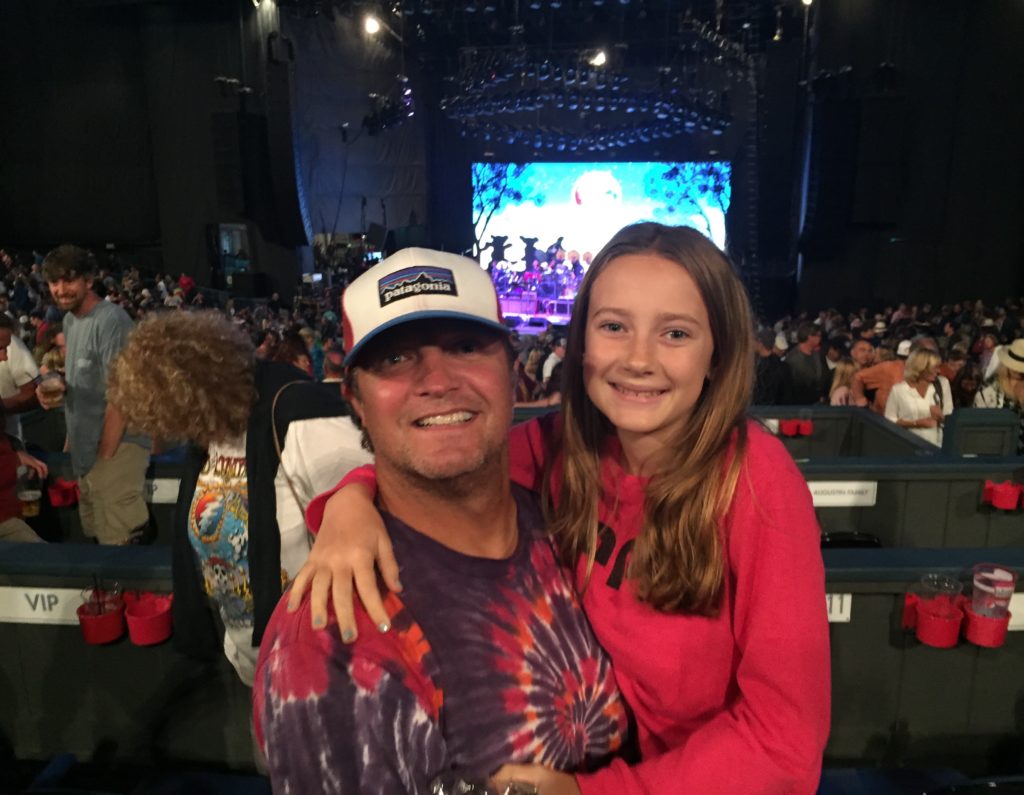
Then the show started. If you’ve never been to a Grateful Dead show before, well, in a nutshell, as an audience member, it’s about just being free. If you want to twirl around, lost in your own wonderful little universe, that’s okay. No one is going to judge you. That’s a powerful thing. Once you feel you can really just be yourself, then the entire experience becomes communal just by nature of the fact that people are not focusing on themselves, so this wonderful vibe of tolerance and fun starts and pretty much lasts for the rest of the show.
We had one especially cool moment; Logan’s known for a while now that, if you pay attention, you can often anticipate which song will be played next live, because The Grateful Dead were always known for leaving little hints of one song inside of another, while the other was still being played. Dead & Company keep this vital tradition alive. Eventually, the previous song dissolves into the next one, and you barely know it’s happened. Unless you pay attention. At one point, before it had actually started, Logan identified “Eyes of the World”…after just a couple of hints! Right then and there, I thought to myself, “You’ve done a fine job raising this child.” (Insert smiley face here). Seriously, that was a proud moment for me.
When Brokedown Palace played at the end, I took Logan in my arms and we danced through the entire song. Someday, I’m hoping to explain things like vintage variation to my kids, using the Grateful Dead as a device for analogy. Depending upon the night, location, whatever was moving them at the time, they never played a song the same way twice. The things you could rely upon…the lyrics for example, and the general melody, were there. But Jerry would take wild creative detours from the narrative of each song. He’d go off-roading around the linearity of the song, introducing new riffs, chord progressions, you name it. He was a master of improvisation.
For me, our vineyard blocks, say, Terraces, by way of example, are each like a Grateful Dead song when it comes to vintage variation. For example. I’ve worked with Terraces for so long that I know what to expect from it in some very specific ways. But vintage variation plays with those identifiers. Some years, the more minerally tones of this block are more evident, particularly in cooler years, like in 2011. In other vintages, the fruit notes are more prevalent. Oftentimes, the structure will change according to vintage. But, no matter what, I can always go back and recognize the Terraces signature. I can’t wait to talk to my kids about farming, grape varieties and cellar work in more detailed ways when they get a little older. And, I’ll be leaning on The Grateful Dead songbook to help me navigate it all.
The morning after the concert, I asked Logan if she’d ever want to go to another show. I asked her tentatively, in that way that dads do with 12-year olds who are by now cooler than their old man. She was intently reading a book and stopped. Looking up, she said, “yes, daddy,” and THAT was the highlight of the entire experience for me.
Drought
How High’s the Water, Mama?
I’m a Libra. And, while I don’t know if I believe ALL of that astrological stuff, it just so happens that I’m always trying to find balance in my life, even in the smallest things. The moment something seems out of balance—I haven’t been exercising enough, or I’m not eating healthfully for a couple of days, or not spending enough time at home—whatever it may be, a few days into that, I’ll start to self-correct so that my life gets back into balance. I’ve always been that way.
So, imagine my frustration when I realized that, when it comes to the drought in California, and the toll it’s taking on our estate vineyard, I can’t just fix the situation so that it gets back into balance. In fact, like most of us in California that are impacted by the drought in one way or another, it’s really all about managing the situation, not finding a resolution.
I’m used to being a farmer and I know that vintage in, and vintage out, Mother Nature will always throw some kind of unforeseen obstacle in the way; harsh winds during bloom, a heat spike at harvest time, whatever it may be. While Mother Nature is in control of about 85 % of what happens each growing season, I’m privileged to be able to have that little 15 % to of wiggle room left to maneuver around the obstacles she places before me, utilizing my own understanding of our estate vineyard and my own choices and inclinations as a winegrower. But, when it comes to this on-going drought we’re having, that’s one obstacle that’s become harder to navigate.
See, we’re unique here in Sta. Rita Hills, in that we are very close to the Pacific, and much of the land planted to vineyards is composed of ancient marine soils. Our entire appellation was once buried under the ocean. In fact, when we were planting our estate vineyard, we found some whale bones out back near the canyon behind the winery. Our proximity to the ocean is what makes Sta. Rita Hills so special; those cool ocean breezes allow for a long-growing season, resulting in potentially great natural acidity in the wines from around here. The result? Wines of vibrancy, energy and clearly delineated flavors.
Sometimes, I’ll leave my car in the parking lot at the winery for 3 days or so…especially during harvest. When I return to it, they’ll be salt built-up on my windshield and I’ll need to wash it off. Now, if that happens to my windshield in three days, imagine the salt that build on the vines and the soils over the course of a 9-month growing season.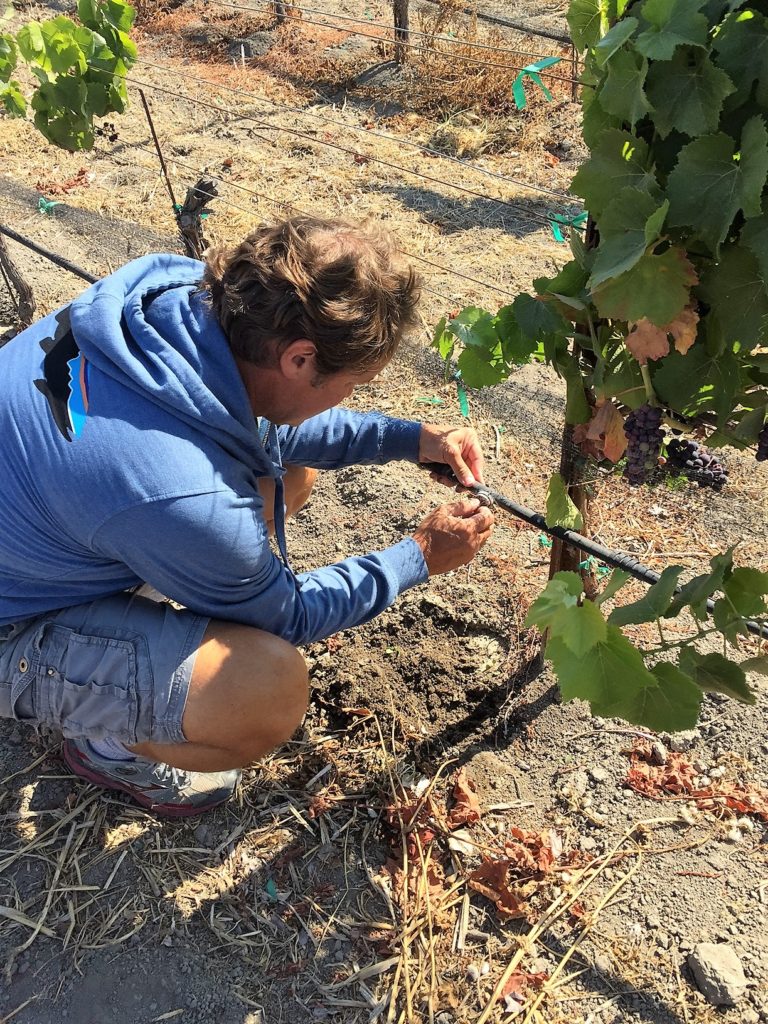
Prior to the drought we’re currently experiencing, frequent winter and spring rains would help to dilute the salt in the vineyards, washing it all downwards. The biggest culprit of salt in our soils is actually not just the winds that carry in those salty ocean breezes, though. It’s our well water and that’s what we use to irrigate our vines. Throughout Santa Barbara County, because of our proximity to the Pacific, there is quite a bit of salinity in just about all the wells around here. And, again, due to the on-going lack of rain, there’s been tremendous salt build-up in our ground water.
Too much salt can really take a toll on a vine. About two times during the growing season, a vine’s roots become pretty aggressive. In the spring, just as the vine is coming out of hibernation, it is hungry and is seeking water and nutrients, so the vines search aggressively for water. This period is called “root flush.” During this time, a vine’s root system is still pretty tender; it’s vulnerable following the period of hibernation and can be adversely effected by too much salt in the soil. In other words, it shocks them, and can stunt growth. Later in the growing season, the vines become especially thirsty again close to harvest. If the water they are wanting is too rife with salt, they become weaker, and more susceptible to disease pressure, from insects and other natural conditions. This can adversely affect vine health and, ultimately, yields at harvest time.
That’s one of the reasons we couldn’t possibly dry-farm here at Melville. We have almost 2,000 vines planted per acre; high-density planting. They’re all competing for water and nutrients, so if we walked away from the vineyard and didn’t water it, the vines would begin to die off slowly. Add to that the fact that our soils are comprised of mostly sandy loams. Sand doesn’t hold moisture all that well. So it’s a necessity that we drip-irrigate our vines. We’re very fortunate here at Melville in that we have a deep well. It goes down about 650 feet down, and the water table is at about 420 feet. So, we are able to drip-irrigate, meaning, we’re not wasting water, but we’re giving our vines enough water so that the soil maintains a moist profile, making it easier for the vines to remain healthy.
If we don’t keep an eye on our irrigation practices, the prevalence of salt in our sandy soils could lead to stunted growth in our vines. We can help the vines out by paying close attention to our cover crops, making certain they thrive, because they help to draw salt out of the soils and away from the vines. We’re trying to prevent the leaves on our vines from turning yellow and red at the edges; this signals that they are literally being burnt by the harshness of too much salt. This would in turn interrupt the process of photosynthesis.
So my job as a farmer is to maintain a moist soil profile in our vineyard during an unusually challenging and protracted drought, while putting other systems in place…like cover crops…to further help assist our vines during growing season. As you can see, there’s no solution in sight that might return balance to our land, save for a good hard rain fall, which I wake up wishing for every day…well, maybe not during harvest.
Turning Japanese
With the debut Notebook, a collection of excepts from my daily journal entries, I hope to share what is unfolding at Melville on a regular basis. I’ll be writing about life in the cellar, the vineyard, at home with my family and on the road, when I’m working the market on behalf of our estate wines. Please feel free to hop along for the ride whenever you’re looking for a little something to read to pass the time.
Earlier this year, I traveled to Japan on behalf of our family winery, to represent Melville at various dinners and tastings. Here are a few recollections from my trip:
Japanese culture is one based upon respect. For example, when I got to Tokyo, I noticed a lot of people wearing face masks. There are essentially three reasons why people often choose to wear face masks in Japan. The first is perhaps the most obvious; they don’t want to get sick from air-borne illnesses. Secondly, they often wear masks because of the pollution in Tokyo, and some of Japan’s other bigger cities, or because of a particularly bad allergy season. But, the third reason is the one I found most compelling and interesting; as an act of courtesy. If one is sick in Japan, one will often wear a mask to protect others from one’s illness. That gesture is borne out of respect.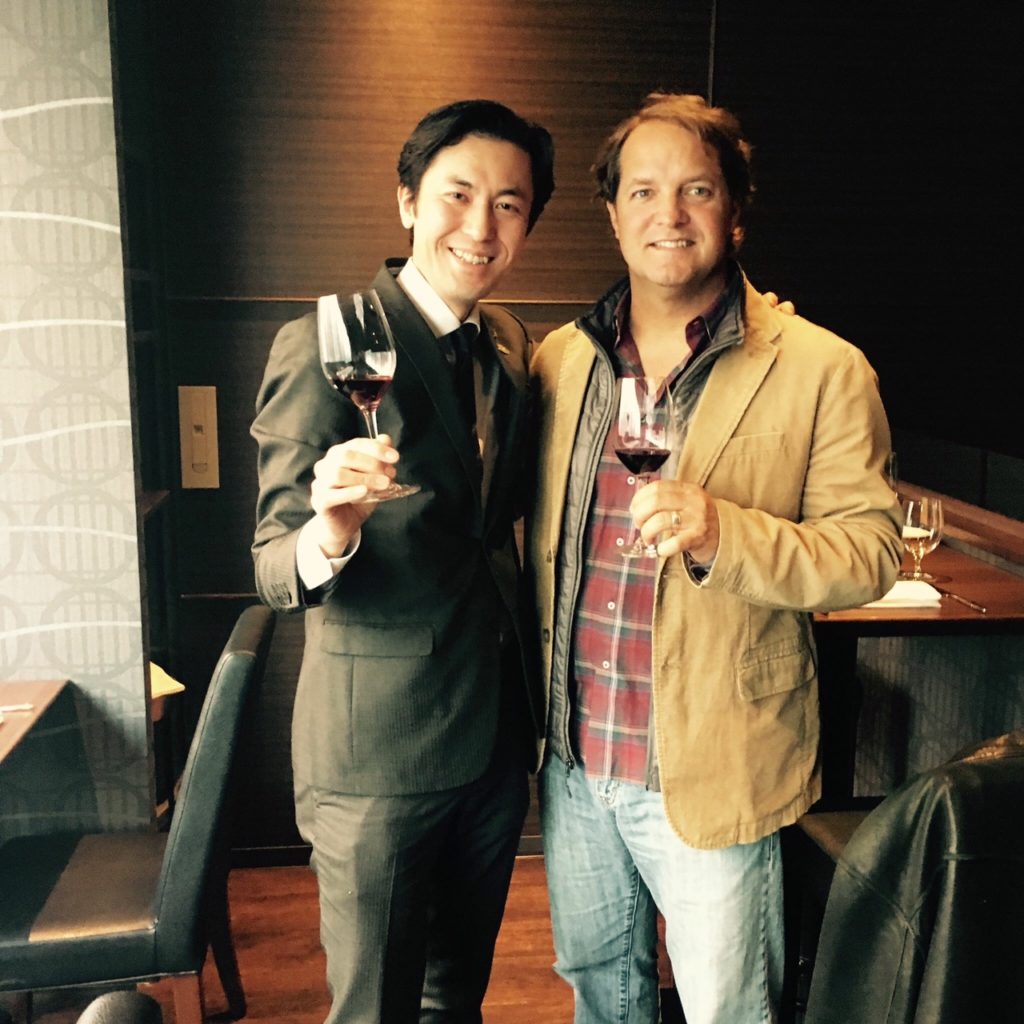
The Japanese don’t shake hands, either: they bow. And, the deeper the bow, the greater the respect being demonstrated. I mean think about that; when you extend your hand to someone, that’s a friendly gesture, to be sure, but still, it’s just extending a hand. But, to prostrate oneself from the waist up for another human being is a pretty big demonstration of respect and humility. Most every time I left a restaurant, someone on the staff there would walk me out, and then bow as I left. What a cool way to finish a meal!
I’m a hugger myself and my first impulse was to hug our hosts each time we concluded a visit. I asked one of my hosts if that was an affront to the Japanese people, because if it was, I was very willing to bow myself. He explained that the Japanese people respect others when they do what is comfortable for themselves. I thought about that for a moment. When Japanese people visit the winery, they always bow upon departure, and I love that, as that is a part of their culture. Wanting to demonstrate my culture a little, I took to hugging out hosts along the way, and that made for some warm and friendly cultural exchanges.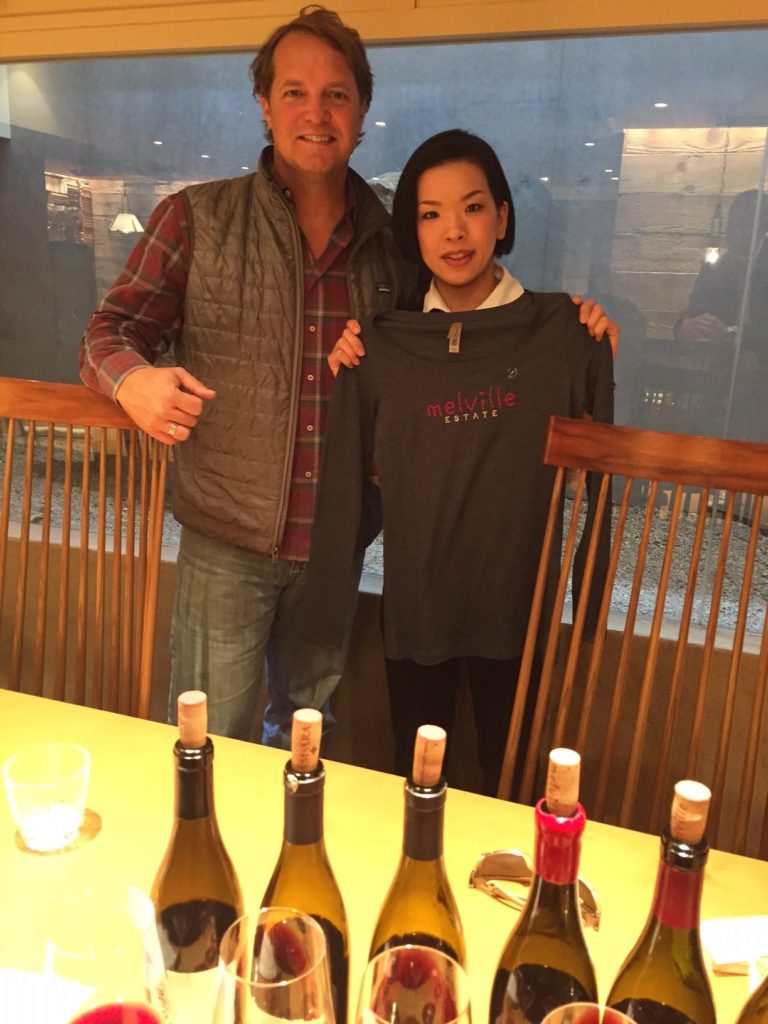
When you’re part of a culture whose underlying tone is one of respect, you’re just going to naturally have some good systems in place. Of course, there are bad apples everywhere, and there’s crime everywhere in the world, to be sure, but the thing about Japan that was really interesting to me was this sense of organization, orderliness and again, respectful behavior that permeated every aspect of everyday life there.
When I departed my hotel in Tokyo for the first day of exploring, I immediately noticed that taxi cab drivers in Tokyo wear suits, ties, a hat and white gloves. In the US, we view taxi cab drivers as hard workers, but we also view their job as somewhat menial; it’s a tough job that probably a lot of folks wouldn’t choose to do if they could do something else. I don’t know what kind of salary cab drivers make in Japan, but they have so much pride in their work. The cabs are very clean and the cabbies there comport themselves with such dignity that my perception of the “cab driver” job was immediately elevated. Witnessing first-hand the level of pride so many Japanese have in their work, no matter what it is, was a very humbling experience. It made me want to always consider the human first, and their line of work, second. By imbuing their work with dignity, Japanese workers make work itself a dignified undertaking.
If you’re a food lover like me, you’ll find the food scene throughout Japan to be spectacular. Precision and Intent; these are the two underlying principles that pretty much inform the food culture of Japan. All of the food I ate there was presented very thoughtfully and beautifully. More often than not, the presentation of the food was exceedingly simple, clean and unadorned. 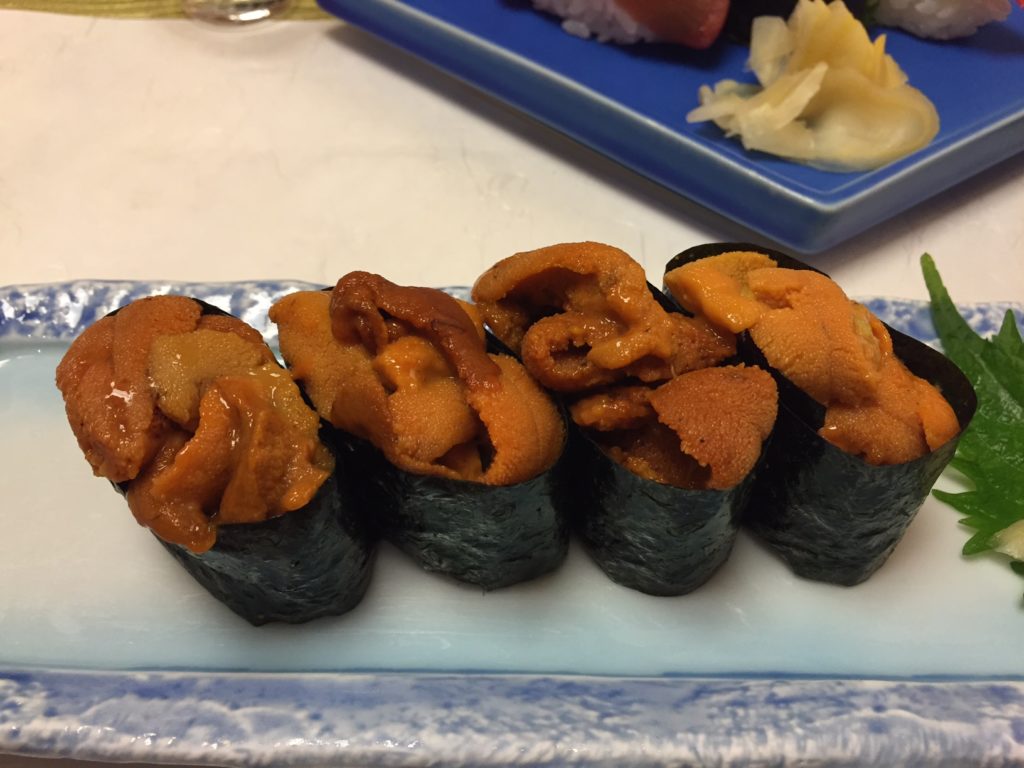 Some of my favorite eateries to visit there were Yakitori restaurants; restaurants that are basically devoted to one dish; chicken on skewers. A lot of these restaurants are no bigger than my office here at the winery. Two people typically work the floor in these small places and you might find three more people in the kitchen. They use every single part of the chicken at these restaurants, and cook it, Yakitori style…on skewers over hot coals. I ate chicken butts; six butts on a skewer. They were awesome! Chicken gristle skewers; those were super crunchy and weird texturally, but very delicious. Chicken hearts. Chicken livers. You name it. Everything but the cluck.
Some of my favorite eateries to visit there were Yakitori restaurants; restaurants that are basically devoted to one dish; chicken on skewers. A lot of these restaurants are no bigger than my office here at the winery. Two people typically work the floor in these small places and you might find three more people in the kitchen. They use every single part of the chicken at these restaurants, and cook it, Yakitori style…on skewers over hot coals. I ate chicken butts; six butts on a skewer. They were awesome! Chicken gristle skewers; those were super crunchy and weird texturally, but very delicious. Chicken hearts. Chicken livers. You name it. Everything but the cluck.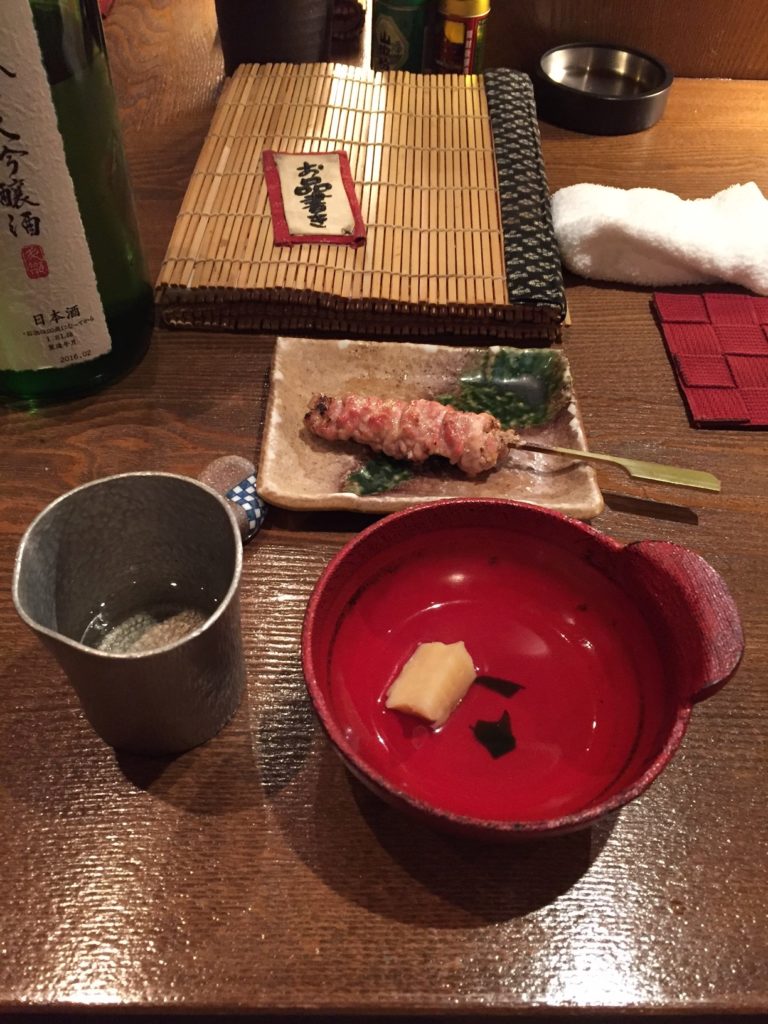
I went to another restaurant that served seafood tempura exclusively. That’s all they did. The chefs there were probably in their 70’s…maybe 80’s. The tempura recipe at this particular restaurant—and this is probably the case for many restaurants in Japan—is the same family recipe that’s been passed from generation to generation. The recipe includes not only how to make the batter, but mentions the oil that must be used and at what temperature everything must be prepared. That is where the precision comes in; very few things seem to happen accidentally in Japan. It’s a culture steeped in intentionality and the precision borne of paying very close attention to all that one does.
We talk about seasonality here in the US. Certainly, in Japan, the concept of seasonality reaches beyond any kind of foodie trend. In all the cities I visited, including Tokyo, Sapporo and Asahikawa, seasonality is an inherent part of their food culture history. When I was in Japan, cod sperm was in season, and I ended up having it on various occasions, because I enjoy ordering Omakase: this means that you’ll essentially agree to have whatever the chef prepares for you, and that you do not need a menu. 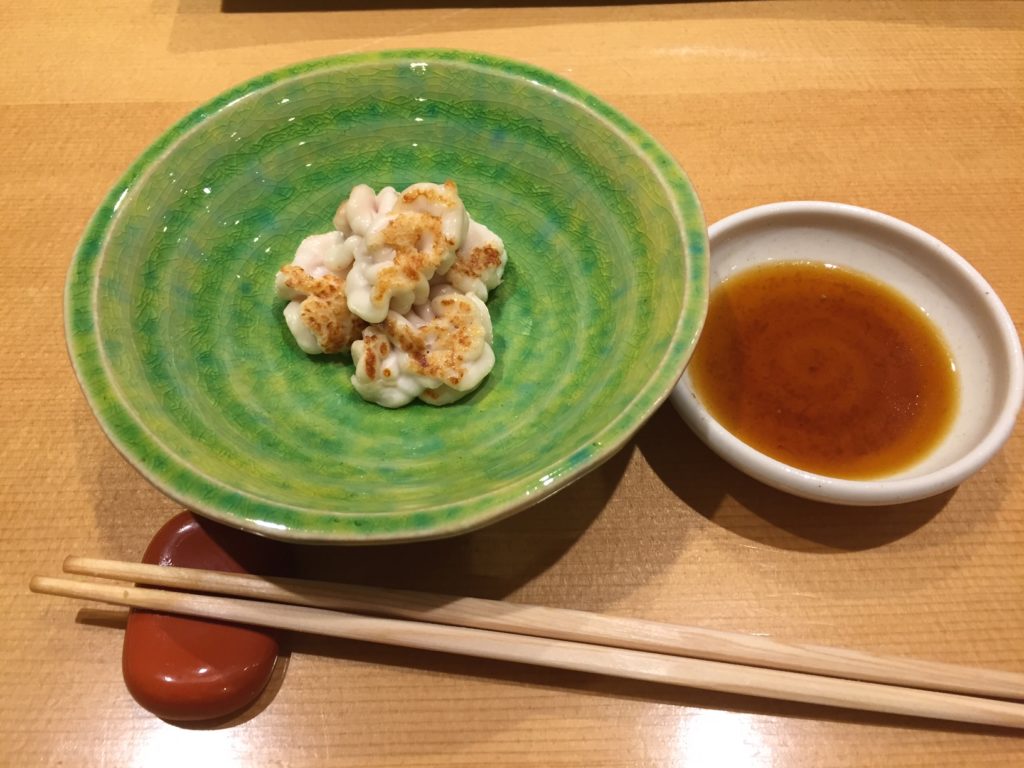 When you order Omakase, it’s important to eat everything that you order. If you do not, it can offend your host or the chef; both which take great pride in their work. So, I was served these sperm sacks on several occasions when I ordered Omakase, a delicacy that’s only in season for 6 weeks out of the year, and it was really sublime.
When you order Omakase, it’s important to eat everything that you order. If you do not, it can offend your host or the chef; both which take great pride in their work. So, I was served these sperm sacks on several occasions when I ordered Omakase, a delicacy that’s only in season for 6 weeks out of the year, and it was really sublime.
What resonated with me most about Japanese food culture, though, is that much of what I ate was served raw and unadorned. As a winegrower and winemaker, I choose not to use adornments in the cellar; from the most egregious additions, like color enhancers, which we have never used at Melville, to more accepted additions, like brand new oak barrels. We choose to pursue our wines in as unencumbered a fashion as possible so that we’re ultimately offering up the taste, if you will, of our estate terroir, pure and unadulterated. Similarly, in Japan, the food there reflects the terroir of their ocean and land life in astonishingly intimate ways; they don’t use a lot of heavy cream sauces, tons of butter and salt, and other adornments that can often mask, rather than elevate, a main ingredient. The best meals I had there were extremely minimal. It was exciting to pair Melville wines with these very simple, fresh dishes; the chefs and I could draw parallels between our creative choices and processes, and that was nothing short of life affirming.
I also really enjoyed learning about sake, and was able to draw even further parallels between sake making and winemaking. The best sake breweries pay great attention to how the rice is milled, the clone of the rice, and other process-oriented decisions that are similar to fine winemaking. One big difference between sake breweries and wineries, though, is that sake makers worship a sake deity. In every sake house we visited, the sake purveyors maintained an altar to the sake deity. They bow to it every morning and say a little meditative prayer to it before they go about their day. The closest thing to a deity that we have at Melville is Mother Nature; we worship her, too. Maybe I should build her some kind of altar at the winery.
I’m very much looking forward to my next visit to Japan. I made some great new friends there, and I discovered a culture and people about which I’d long been intrigued, but that I’d only really known from books and movies. Being able to immerse myself in that culture, if only for a couple of weeks, inspired me greatly. Since returning to the states, I’ve made an effort to stay present during all of my daily tasks in the vineyard and in the cellar. I’m more mindful now and apply more precision and intentionality to my own work. If for no other reason, traveling the globe allows us to learn from other cultures and to be enriched by them in the process.
The Immutable Sta. Rita Hills Appellation
The founding of our family winery, by my father, Ron, was based upon a very purposeful decision. After searching up and down California for a piece of land ideally suited to the cultivation of Pinot Noir and Chardonnay, he decided upon the Sta. Rita Hills growing region. Painstakingly drawn by regional pioneers like Richard Sanford and Bryan Babcock, the boundaries of this special place were set forth and clearly delineated to highlight its superlative combination of climate and soils. Its close proximity to the Pacific, as well as the east-west orientation of our transverse mountain range, nearly defines this unquestionably singular growing region.
Recently, the eastern boundary of the appellation was expanded following a petition spearheaded by a Los Angeles-based real estate developer. The appellation’s expansion, at least according to the TTB (Alcohol Tax and Trade Bureau) decision, was arrived at not by the TTB coming to our area to walk the boundary lines and assess the situation in person. Instead, it was made academically and administratively, at a remove, by reviewing a lot of data. Farmers understand, though, that the true nature of a piece of land and its surrounding climes cannot be arrived at by staring at reams of paperwork.
The new AVA boundary now includes the Buellton Flats, which ought to belong in the always much-warmer Santa Ynez Valley appellation. It’s pretty obvious to most of us working the land here daily that, beyond the eastern boundary of this appellation, the terrain and climate change dramatically. Data from weather stations used in this petition, located in Cebada Canyon and Ballard Canyon, are not actually located within the Sta. Rita Hills growing region. Moreover, if you simply drive in your car and head east from Lompoc towards Buellton, it’s very apparent, even in the air, how much warmer it is where the new boundaries now exist.
On a personal level, the original appellation boundary lines will always define for me the true Sta. Rita Hills growing region. Those boundary lines are as immutable to us as are the boundaries around Chablis or Cote de Nuits.
While I am all for progress and change, I am also a traditionalist and a romantic. Truly legendary places and institutions are built upon strong foundations. If a foundation is ever-shifting, how can permanence and true greatness ever emerge there?


